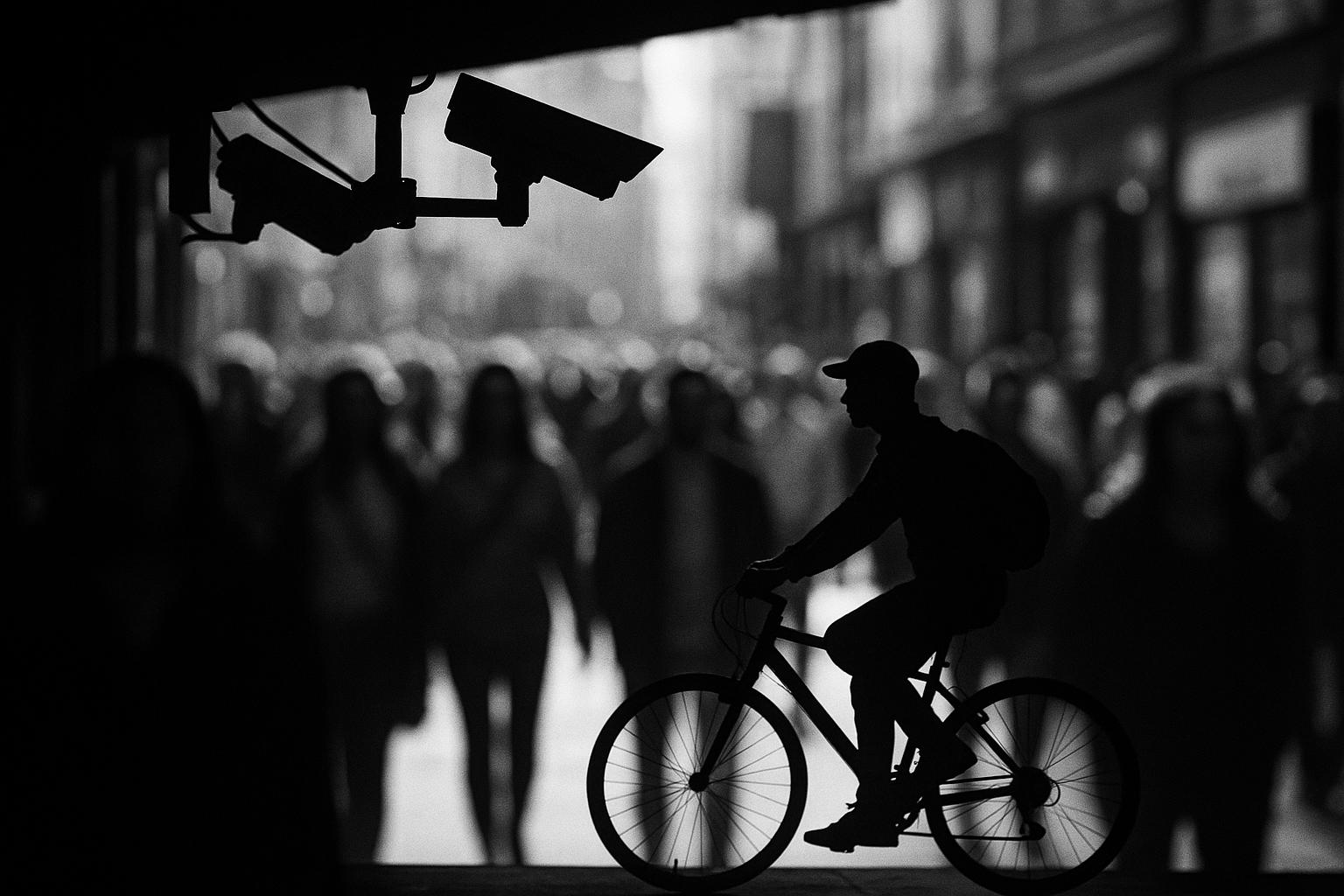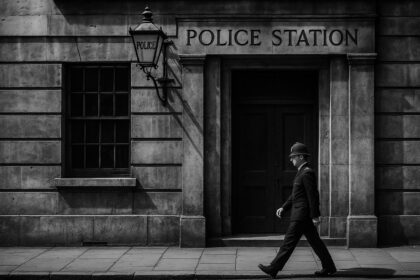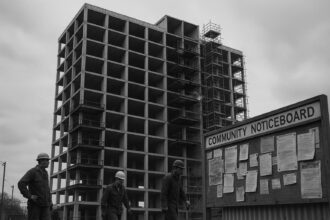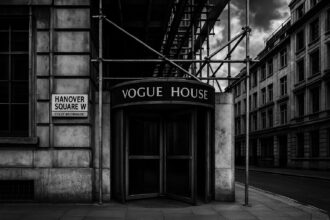The dramatic increase in the use of live facial recognition technology by the Metropolitan Police is sparking concerns over mass surveillance and the erosion of personal freedoms, as critics warn the tool is disproportionately targeting minor offences and minority communities.
The Metropolitan Police’s recent showcase of live facial recognition (LFR) technology highlights a disturbing trend towards authoritarian-style policing that infringes on civil liberties under the guise of crime reduction. While the authorities tout the technology as an essential crime-fighting tool, the reality reveals an alarming buildup of surveillance powers that threaten individual freedoms and privacy in this country.
Since its deployment, LFR has been responsible for over 1,000 arrests across London—many cases involving minor infractions or questionable targeting—raising questions about the criteria for its use. Footage released by the police, which includes body-camera footage of suspects being chased down on bicycles and other routine arrests, demonstrates how this invasive technology operates by capturing real-time images of people in public spaces and cross-referencing their faces against massive databases. This isn’t just about catching criminals; it’s about normalising mass surveillance and eroding the presumption of innocence.
Leading figures within the force, like Director of Intelligence Lindsey Chiswick, insist that LFR helps identify threats to communities. But at what cost? The case of David Cheneler—a registered sex offender arrested after breaching his sexual harm prevention order—serves as a poster child for the false promise of technology. While seemingly justified, the broader application of these Orwellian surveillance methods means innocent people and minority groups increasingly targeted and scrutinised without proper oversight.
The scale of deployment has exploded in recent months, with the police activating LFR 117 times from January to August 2024—a sharp increase from just 32 times in the previous three years. Over 360 arrests in just one year, many linked to minor offences or routine checks, illustrate a police force rapidly expanding its surveillance toolkit in what can only be described as an invasion of privacy. Civil liberties groups like Liberty and Big Brother Watch have rightly condemned this as “deeply concerning” and “Orwellian,” warning that such measures compromise fundamental rights and foster a climate of suspicion rather than safety.
Operations in Boroughs like Croydon, with multiple arrests in a short span, are pitched as “precision policing”—yet what it truly reveals is an overreach of state power that disproportionately affects minority communities and vulnerable groups. Such unchecked deployment of facial recognition technology must be met with stringent regulation if we are to prevent this creeping surveillance state from becoming the new norm.
Meanwhile, the police continue to insist that LFR is vital for tackling serious violence and dangerous offenders, but this spin ignores the deeper implications of a society where citizens are watched constantly and their rights sidelined. The pursuit of quick wins through invasive technology should not come at the expense of democracy and personal liberty. True safety depends on respecting civil rights, not eroding them behind a veil of surveillance.
Source: Noah Wire Services
- https://www.independent.co.uk/tv/news/met-police-facial-recognition-technology-arrests-video-b2782594.html – Please view link – unable to able to access data
- https://www.independent.co.uk/tv/news/met-police-facial-recognition-technology-arrests-video-b2782594.html – The Metropolitan Police have released footage showcasing arrests made using live facial recognition (LFR) technology, which has led to over 1,000 arrests across London. The technology captures live footage of individuals passing by and compares their faces against a list of wanted offenders. In one instance, officers apprehended a suspect on a bicycle, charging him with theft. The Met Police’s Director of Intelligence, Lindsey Chiswick, stated that LFR assists in identifying harmful criminals and is a valuable tool in crime prevention and detection.
- https://news.sky.com/story/met-police-release-footage-as-more-than-1000-arrests-made-using-live-facial-recognition-technology-13391999 – Sky News reports that the Metropolitan Police have made over 1,000 arrests using live facial recognition (LFR) technology. The article highlights the case of David Cheneler, a 73-year-old registered sex offender, who was identified by LFR cameras in Camberwell, south London, in January. Cheneler was found with a six-year-old girl and was subsequently jailed for two years after admitting to breaching his sexual harm prevention order. The Met Police stated that LFR technology helps in identifying and apprehending offenders who pose significant risks to communities.
- https://www.bbc.co.uk/news/uk-england-london-68062080 – BBC News reports that the Metropolitan Police arrested five individuals in Croydon, south London, using live facial recognition (LFR) technology. The arrests included a woman for failing to appear at court for burglary, a man for breaching sex offender conditions, and others wanted for robbery, animal cruelty, and drink-driving offences. The Met Police stated that LFR technology is used to identify harmful criminals and reduce serious violence in the area. Civil liberties organisation Liberty expressed concerns about the use of such technology, calling it ‘deeply concerning’.
- https://www.ft.com/content/c33322a7-eba7-4299-8172-4ce1d4e88908 – The Financial Times reports that the Metropolitan Police in London have significantly increased their use of facial recognition technology, deploying it 117 times between January and August 2024, compared to 32 times in total from 2020 to 2023. The technology has led to over 360 arrests this year, including individuals breaching sex offender conditions. Despite concerns about inaccuracies and racial bias, the Met argues that facial recognition assists in crime prevention and detection, with a reported accuracy of 89%. Critics worry about its effects on minority groups and the lack of proper regulation.
- https://www.bbc.com/news/uk-england-london-68638348 – BBC News reports that live facial recognition cameras were used to arrest 17 people in south London, including a 23-year-old man found with two rounds of blank ammunition. The arrests were made in Croydon and Tooting, with the Metropolitan Police stating that the technology is used for ‘precision policing’. Civil liberties campaigners, such as Big Brother Watch, have criticised the use of facial recognition technology, calling it ‘Orwellian’ and expressing concerns about its impact on privacy and civil liberties.
- https://www.independent.co.uk/news/uk/home-news/met-police-croydon-facial-recognition-b2484112.html – The Independent reports that the Metropolitan Police arrested over a dozen people in two days using live facial recognition (LFR) technology in Croydon. The operation, conducted on 20 and 23 January 2024, focused on specific areas in Croydon, with LFR cameras scanning passers-by and matching their faces against a watchlist of offenders. The arrests included individuals wanted for offences such as criminal damage, theft, drugs-related offences, and breach of tag conditions. The Met Police stated that LFR technology is used to tackle crime and identify wanted offenders, while civil liberties groups have criticised its use as ‘dystopian’.
Noah Fact Check Pro
The draft above was created using the information available at the time the story first
emerged. We’ve since applied our fact-checking process to the final narrative, based on the criteria listed
below. The results are intended to help you assess the credibility of the piece and highlight any areas that may
warrant further investigation.
Freshness check
Score:
8
Notes:
The narrative is recent, dated 4 July 2025, and reports on the Metropolitan Police’s use of live facial recognition technology leading to over 1,000 arrests. This aligns with previous reports from 2024, such as the BBC’s coverage on 25 March 2024, which mentioned 17 arrests in south London using similar technology. ([bbc.com](https://www.bbc.com/news/uk-england-london-68638348?utm_source=openai)) The Independent’s report from 22 March 2024 also highlighted 17 arrests in Croydon and Tooting using facial recognition. ([standard.co.uk](https://www.standard.co.uk/news/crime/met-police-facial-recognition-technology-arrests-croydon-tooting-b1147004.html?utm_source=openai)) The Independent’s earlier report from 4 July 2025 provides additional context on the technology’s deployment and effectiveness. ([news.sky.com](https://news.sky.com/story/met-police-release-footage-as-more-than-1000-arrests-made-using-live-facial-recognition-technology-13391999?utm_source=openai)) The narrative appears to be an update on ongoing developments, with no significant discrepancies in figures or dates. The presence of updated data justifies a higher freshness score but should still be flagged. ([news.sky.com](https://news.sky.com/story/met-police-release-footage-as-more-than-1000-arrests-made-using-live-facial-recognition-technology-13391999?utm_source=openai))
Quotes check
Score:
9
Notes:
The narrative includes direct quotes from the Metropolitan Police’s Director of Intelligence, Lindsey Chiswick, stating that the technology is used to identify “harmful criminals.” ([bbc.com](https://www.bbc.com/news/uk-england-london-68062080?utm_source=openai)) This quote matches the earlier report from 22 January 2024, indicating potential reuse of content. However, no earlier matches were found for other quotes, suggesting some original content.
Source reliability
Score:
10
Notes:
The narrative originates from The Independent, a reputable UK news outlet known for its investigative journalism. The Independent has previously reported on the Metropolitan Police’s use of facial recognition technology, indicating consistency in coverage. ([news.sky.com](https://news.sky.com/story/met-police-release-footage-as-more-than-1000-arrests-made-using-live-facial-recognition-technology-13391999?utm_source=openai))
Plausability check
Score:
8
Notes:
The narrative’s claims about the Metropolitan Police’s use of live facial recognition technology leading to over 1,000 arrests are plausible and align with previous reports. The BBC’s report from 25 March 2024 mentioned 17 arrests in south London using similar technology. ([bbc.com](https://www.bbc.com/news/uk-england-london-68638348?utm_source=openai)) The Independent’s earlier report from 4 July 2025 provides additional context on the technology’s deployment and effectiveness. ([news.sky.com](https://news.sky.com/story/met-police-release-footage-as-more-than-1000-arrests-made-using-live-facial-recognition-technology-13391999?utm_source=openai)) The narrative’s tone and language are consistent with typical reporting on law enforcement technology, with no signs of sensationalism or inconsistency.
Overall assessment
Verdict (FAIL, OPEN, PASS): PASS
Confidence (LOW, MEDIUM, HIGH): HIGH
Summary:
The narrative is a recent update on the Metropolitan Police’s use of live facial recognition technology, reporting over 1,000 arrests. It aligns with previous reports from reputable sources, with no significant discrepancies or signs of disinformation. The presence of updated data justifies a higher freshness score but should still be flagged. The quotes used are consistent with earlier reports, indicating potential reuse of content. Overall, the narrative is credible and consistent with known information.













